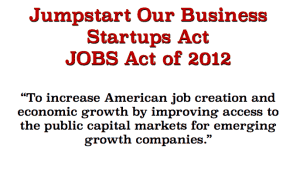Followers of the investment crowdfunding space all know the real estate sector is very hot. Big names and big deals are migrating to the new approach to fund all types of property. iFunding is one of these companies that claims a top pedigree of founders and managers with a view towards global expansion. The young company, led by CEO and founder William Skelley, has recognized the potential and is quickly capitalizing on the opportunity of this disruptive shift in finance.
 iFunding is expanding opportunities for individuals to invest in institutional-quality real estate deals, through their platform. Crowdfunding makes it faster and easier for real estate developers and operators to raise funds, build investor relations, and take care of legal and financial administration for projects.
iFunding is expanding opportunities for individuals to invest in institutional-quality real estate deals, through their platform. Crowdfunding makes it faster and easier for real estate developers and operators to raise funds, build investor relations, and take care of legal and financial administration for projects.
 iFunding has moved quickly to stack their executive bench with managers that possess solid backgrounds in finance, real estate and politics. iFunding made an influential appointment earlier this year when former New York Governor David Paterson became Director of Community. They were also the first investment platform to release an iPhone / Android app so you may access their deals pretty much anywhere – anytime.
iFunding has moved quickly to stack their executive bench with managers that possess solid backgrounds in finance, real estate and politics. iFunding made an influential appointment earlier this year when former New York Governor David Paterson became Director of Community. They were also the first investment platform to release an iPhone / Android app so you may access their deals pretty much anywhere – anytime.
iFunding is moving quickly in the United States but they have also expanded outside the country and established a base of operations in Singapore – where they expect to broaden their reach into 18 different Asian countries.
iFunding wants to open up the real estate industry to investors who previously did not have access to the asset class. To date the platform has raised over $31 million for over 25 different projects but this is only the beginning.
Prior to launching iFunding, William Skelley was involved in advising clients on transactions in excess of $2 billion across the capital structure. William was a principal at Rose Park Advisors, a hedge fund founded by legendary Harvard Business School professor Clayton Christensen. I recently had the opportunity to connect with William to hear about iFunding and his vision for the future of real estate crowdfunding.
_________________
Crowdfund Insider: What inspired to you to launch iFunding and to get into the investment  crowdfunding space?
crowdfunding space?
William Skelley: Before the downturn several years ago, I owned a boutique investment bank. When Lehman and others went under, real estate came to a halt. I was thinking of my next steps and came upon the Harvard Business School’s executive program. I met strategy professor and author Clayton Christensen there and, after the program, joined his hedge fund. One investment we made was in CircleUp, which is now the largest crowdfunding angel investing platform in the US, with a $7m cash investment from Google and Union Square Ventures. From these experiences, I realized the same potential for innovation was applicable to real estate.
Crowdfund Insider: Having worked at Rose Park, alongside Clayton Christensen, how does his theory of disruptive innovation mesh with crowdfunding? The real estate industry?
William Skelley: Clayton wrote “The Innovator’s Dilemma,” which laid out the theory of disruptive innovation. That is, the characteristics of competitors that make them successful and profitable and what they do, also makes them reluctant to adopt new approaches that would cannibalize their existing revenue model. Clayton was named the world’s most influential management thinker for two years straight; I recommend his books and articles.
 The concept of disruptive innovation is deeply aligned with crowdfunding and real estate. For most of the last century, regulations about private securities and the local nature of properties and professional relationships among high net-worths and their advisors, meant that only a select few were able to participate in the diversification potential and strongly attractive returns of direct real estate deals, consumer loans, invention backing, and other less liquid asset classes. Through crowdfunding over $5 billion has been invested by individuals in an online market to finance consumer loans at Lending Club, Prosper, and others. In real estate, another market with traditionally limited access to institutional-quality deals, investors can now get involved with projects that potentially yield double digit returns, with as little investment as a few thousand dollars.
The concept of disruptive innovation is deeply aligned with crowdfunding and real estate. For most of the last century, regulations about private securities and the local nature of properties and professional relationships among high net-worths and their advisors, meant that only a select few were able to participate in the diversification potential and strongly attractive returns of direct real estate deals, consumer loans, invention backing, and other less liquid asset classes. Through crowdfunding over $5 billion has been invested by individuals in an online market to finance consumer loans at Lending Club, Prosper, and others. In real estate, another market with traditionally limited access to institutional-quality deals, investors can now get involved with projects that potentially yield double digit returns, with as little investment as a few thousand dollars.
 Crowdfund Insider: What is your vision for the future of real estate crowdfunding?
Crowdfund Insider: What is your vision for the future of real estate crowdfunding?
William Skelley: I could easily see crowdfunding impacting billions of dollars in real estate investing in the next few years. Right now, we’re in an early but fast-growing stage. My firm was one of the first few RE crowdfunding platforms and remains one of the most well-established and biggest funders, though there are now scores of companies trying to get into the space. For iFunding, we envision crowdfund investors becoming more sophisticated, seeking a variety of deals – equity or debt, residential or commercial, flip-and-sell or buy-and-hold – from a reliable crowdfund service with strong processes and technology.
Crowdfund Insider: How are you sourcing your deals? Is this by word of mouth?
William Skelley: We rely both on word of mouth and on selective outreach to quality operators. A hundred or more operators contact us each month, so we can afford to be selective but still quick in screening opportunities to find strong deals. For more strategic opportunities – high-profile buildings, rebuilding of communities – we will initiate talks with very experienced operators, investment backers, and professional contacts we have to create arrangements.
Crowdfund Insider: How many operators are using your site today?
William Skelley: We track the hundreds of operators that have submitted specific deals to us for consideration. In the period of just under a year we’ve been fully operational, we’ve had just under twenty operators fundraise with us, some multiple times.
 Crowdfund Insider: Do you invest in any of the offers listed on your site?
Crowdfund Insider: Do you invest in any of the offers listed on your site?
William Skelley: We make it a general practice to invest in the offers on our site, as it shows both the investors and our development partners how we believe in the deals we list. In fact, our business model is geared so that most our profits only are realized if a deal completes profitably for all parties involved.
Crowdfund Insider: Does your platform offer only equity deals or debt as well?
William Skelley: We offer to crowdfund either equity or debt investments. In our first year, we were known more for preferred equity investments, where the investors receive a first tranche of profit margin, then the investors, project operator, and the crowdfund platform, share the remaining profits. The average returns, across projects and time, in real estate tend to be significantly higher with equity, though you are participating in profits in losses rather than a fixed return rate with a lien on the property. At this point, we have both operators, individual investors and family offices interested in seeing more debt deals, and combination equity & debt, so iFunding users will find more of these in the fall 2014 and 2015.
Crowdfund Insider: Are you doing only 506c offers?
William Skelley: We have focused on 506b offers so far, as we believe that has been the most conservative approach to working with federal regulations and filings, as well as accredited investors. Investors self-assert whether they meet the income or asset requirements to be considered accredited. 506c requires that accredited investors either submit a letter from their lawyer or CPA confirming income or assets, or a system-check of their income reported income. And it can be more costly to file across the country. However, 506c allows for “general solicitation,” that is, publicity about the deals available that can be shared with anyone. When certain properties are likely to be noteworthy from an investor and news perspective, such as a high-rise or a community rebuilding initiative, then it makes sense to list under 506c. We think our investors and development partners will enjoy the option to participate in one, the other or both.
 Crowdfund Insider: What about listing deals under the evolving crowdfunding regulations? That is Title III of the JOBS Act, or Title IV (Reg A or A+)?
Crowdfund Insider: What about listing deals under the evolving crowdfunding regulations? That is Title III of the JOBS Act, or Title IV (Reg A or A+)?
William Skelley: The three frameworks you mention are challenging to operate under and we do not use them. However, we do like some of the state-by-state regulations that are emerging. Title III of the Jumpstart our Businesses (JOBS) Act permits hasn’t been finalized, but many real estate investment professionals consider it impractical without revisions. A crowdfund platform can only raise up to $1 million per year for all its projects. Reg.A limits a crowdfunder to $5m total raised per year. Filings are said to be complex, similar to filing to go public. That’s too little scale and too much expense to make an Internet innovative disruption play work well. Reg.A+, meant to be a fix in certain respects of Reg.A, certainly is a step in the right direction. While the specifics are still under review, at this point I believe it would allow up to $50m in fundraising per year through a crowdfunding platform. However, we’re thinking we need more scale than that for iFunding’s potential, so let’s see where Reg.A+ winds up.
Crowdfund Insider: What about intrastate crowdfunding regulations?
William Skelley: There are very interesting rules appearing at the state level and I expect you’ll see  deals listed by iFunding in certain states in the near future. At least a dozen states have regulations in place making it much easier for anyone to invest in any kind of crowdfund project, as long as both the project and the investors reside within that state. Investors usually don’t have to be accredited and in some cases can invest as little as $100/deal or up to 5-10% of their annual income or asset base each year. Texas is set to vote on its law at any moment now, Washington DC is in the news with its policy review, and other places like Connecticut are considering adopting similar approaches.
deals listed by iFunding in certain states in the near future. At least a dozen states have regulations in place making it much easier for anyone to invest in any kind of crowdfund project, as long as both the project and the investors reside within that state. Investors usually don’t have to be accredited and in some cases can invest as little as $100/deal or up to 5-10% of their annual income or asset base each year. Texas is set to vote on its law at any moment now, Washington DC is in the news with its policy review, and other places like Connecticut are considering adopting similar approaches.
 Crowdfund Insider: Please share your vision for iFunding Asia.
Crowdfund Insider: Please share your vision for iFunding Asia.
William Skelley: Asia is exciting. Jules Kwan and Alice Chen are iFunding’s executives based in Singapore who are leading the charge. I’ll let them share their thoughts here:
“Asia is an increasingly important part of the world economy. By 2020, it’s predicted that Asia’s top 10 economies together will generate 17% more GDP than the US. Residentially, while Asia only has one-tenth as many mortgage loans as the US today, this financing is forecasted to double by 2020. We believe that Asia – across its economies and cultures – is entering its time in the sun and that any business that intends to be a global force needs to have an Asian initiative. The growth of wealth in Asia and the appetite for investment, especially in real estate, into developed markets like the US, Australia and the UK, is on the rise. Although generally years behind the US in terms of Internet use for business transactions, Asia catching up fast. The vision is to begin bringing Asian capital into developed markets, starting with the US, where we have transparency and a credible marketplace and developers who we can trust. In due time, we will be doing deals in Asia for Asians and also opening up those opportunities to investors from outside of Asia. There are many different regulatory hurdles to overcome in each country and we are addressing one by one.”







